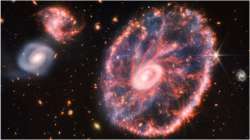Colourful pics of new galaxies by Webb telescope go viral; netizens wonder where Big Bang happened
The Cartwheel Galaxy, located about 500 million light-years away in the Sculptor constellation, is a rare sight appearing much like that of the wheel of a wagon. See the photos here.

Netizens can't believe their eyes as the powerful next-generation James Webb Space Telescope has captured colourful images of Cartwheel Galaxy. It is located about 500 million light-years away. The photos posted by NASA give a beautiful view of the universe with multiple galaxies in view. Using its powerful infrared cameras, Webb produced a detailed image of the Cartwheel and two smaller companion galaxies against a backdrop of many other galaxies. The Cartwheel Galaxy, located about 500 million light-years away in the Sculptor constellation, is a rare sight appearing much like that of the wheel of a wagon.
While these images are absolutely beautiful to look at, they have lead to many curious questions from netizens. They want to know more about these galaxies, how they are different from Milky Way and some also wonder if we can find out the point of the origin. That is, can we locate the place where Big Bang happened?
Photos of Cartwheel Galaxy
Here's how netizens reacted, sample some of these curious tweets:
More About Cartwheel Galaxy
The Cartwheel Galaxy sports two rings -- a bright inner ring and a surrounding, colourful ring.
These two rings expand outwards from the centre of the collision, like ripples in a pond after a stone is tossed into it. Because of these distinctive features, astronomers call this a "ring galaxy," a structure less common than spiral galaxies like our Milky Way.
The bright core contains a tremendous amount of hot dust with the brightest areas being the home to gigantic young star clusters. On the other hand, the outer ring, which has expanded for about 440 million years, is dominated by star formation and supernovas.
As this ring expands, it ploughs into surrounding gas and triggers star formation.
In the image, data from Near-Infrared Camera (NIRCam), are coloured blue, orange, and yellow.
The galaxy displays many individual blue dots, which are individual stars or pockets of star formation. NIRCam also reveals the difference between the smooth distribution or shape of the older star populations and dense dust in the core compared to the clumpy shapes associated with the younger star populations outside of it.
Webb's Mid-Infrared Instrument (MIRI) reveals finer details about the dust that inhabits the galaxy.
MIRI data, coloured red in the composite image, reveals regions within the Cartwheel Galaxy rich in hydrocarbons and other chemical compounds, as well as silicate dust, like much of the dust on Earth.
Other telescopes, including the Hubble Space Telescope, have previously examined the Cartwheel. But the dramatic galaxy has been shrouded in mystery -- perhaps literally, given the amount of dust that obscures the view. Webb, with its ability to detect infrared light, now uncovers new insights into the nature of the Cartwheel.
About James Webb Space Telescope
The $10 billion Webb telescope, is an international programme led by NASA, European Space Agency and the Canadian Space Agency.
The telescope's actual aim is to solve mysteries in our solar system, look beyond distant worlds around other stars, and probe the mysterious structures and origins of our universe and our place in it.
--with IANS inputs
This scary accident video by Delhi Police is reminder of why one shouldn't pull off stunts on roads
What is Commonwealth Games lawn bowls? Twitterati don't know but they're proud of India bagging gold
Bengaluru traffic police reveal the meaning of new signboard with four dots; netizens laud